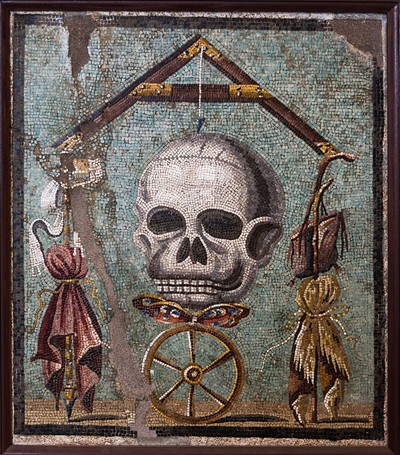
To see the previous installments, click on the following links: #1, #2 , #3, #4, #5, #6, #7, #8, #9, #10, #11, #12, #13, #14, #15, #16, #17
In the afternoon, I went to Marcus Varius' house to question his son. The atmosphere was even more sombre. I knew that this conversation would be the most difficult of all, for the young man, in the eyes of many, was nothing more than a fragile, unstable boy, trapped in his own shadows. But I saw something deeper: a tormented mind, lost in fear and guilt. The boy was unaware of the extent of his actions. He was on the verge of a fracture that could lead him into an abyss from which he would never return.
Entering the room, I found him sitting in the corner, rocking slightly, his eyes lost, unable to focus on reality. He was a young man of barely fourteen, but his eyes were aged, as if he had seen too much for his short life. His small body seemed to have shrunk even more since I first saw him, and there was something unsettling about him, something that didn't quite fit with the calm that the house was trying to project.
“Can I talk to you,” I asked softly, aware that any ill-chosen words might worsen his condition.
He looked at me, his eyes glassy and absent. He did not answer immediately, but nodded slightly, as if granting me tacit permission to stay.
I sat across from him, trying to appear less threatening. I knew that, in his mind, everyone around him could be a potential enemy. I took a deep breath and began to speak in the same calm tone I had used earlier with his family.
“I want to understand what happened,” I said, “I know you didn't mean to hurt anyone.”
The young man blinked several times, and for a moment, I saw a flash of something akin to fear in his eyes. His body trembled almost imperceptibly, but it was clear that inside him there was a storm raging.
“I didn't... I didn't want to kill him,” she whispered, her words barely audible. “I just wanted to... protect myself. Protect my mother... myself.”
He paused, as if those words were difficult to utter, and hugged himself, rocking again.
“There was someone behind the curtain. I saw him move... it was there, lurking,” he continued, his eyes wide open, as if he could still see that ghostly figure behind the veil of the curtain.
“I thought he wanted to hurt us. I took the sword... I just wanted to... stop him before it was too late.”
He knew he was reliving every moment in his mind, trapped in a cycle of terror and guilt. He wasn't a killer, that much was clear. He was a boy lost in his delusions, unable to distinguish between reality and the fantasies his mind created.
“Lucius... I didn't know it was him,” he said in a whisper, his voice full of panic. “I didn't know, I couldn't know. I thought it was someone else, someone coming after me.”
“It was an accident,” I said, trying to calm him down. “You didn't mean to hurt him. It was a casus, non homicidium.”
He nodded, though his eyes were still lost. I wasn't sure he understood my words, but there was some relief in his posture. He was clinging to the idea that he was not guilty, that he was only acting in self-defence, even if that defence had been misdirected.
“I wanted to protect my mother,” he repeated, as if that was the only truth he could remember amidst the chaos in his mind. “I saw him behind the curtain. It all happened so fast... I couldn't stop.”
I realised there wasn't much more I could do for him. His mind was too affected, and although words could comfort him momentarily, the reality of what he had done would not go away so easily. In the eyes of Roman society, he could be seen as a troubled soul, someone whom the gods had abandoned or punished with a mental imbalance.
“You have done what you thought necessary,” I said gently, getting up to leave. “It will all come out and justice will clear it up.”
As I left the room, I listened as the young man continued to mutter to himself, clinging to his version of events. For him, there was no doubt: he had acted out of fear, to protect what he held most dear. But in the outside world, outside his broken mind, the consequences of his actions were already unfolding like shadows covering his entire family.
There was something tragic about it all, something that made me wonder how fate, or the gods, had played with this young man's life. He was but a pawn in a much bigger game, one I would never fully understand, and now he bore the burden of a death he had not wanted to commit.
To be continued
Header Image:
Memento Mori. Source: National Archaeological Museum of Naples
Poor boy. But there’s something more intriguing hidden beneath, isn’t there? I’m looking forward to reading more.
Yes, Yumi ( @yumiyumayume ), there is a certain suspense in Vespasian's imperial justice, plus there is the eruption of Vesuvius that will bury the city of Pompeii and will affect the characters. But most intriguing of all will be the appearance of the plaster casts of two lovers that a high school teacher will have to explain to his students on a field trip to the ruins of Pompeii and Herculaneum in 2012.
Oooh! I can't wait to read the part!!!
Thank you very much, Uly ( @CocoPop ), after your last suspenseful post....